Promoting
Child AND
Parent
Wellbeing
of related interest
Tackling Child Neglect
Research, Policy and Evidence-Based Practice
Edited by Ruth Gardner
ISBN 978 1 84905 662 5
eISBN 978 1 78450 165 5
A Practical Guide to Early Intervention and Family Support
Assessing Needs and Building Resilience in Families Affected by Parental Mental Health and Substance Misuse
Emma Sawyer and Sheryl Burton
ISBN 978 1 90939 121 5
eISBN 978 1 90939 130 7
Social Work with Troubled Families
A Critical Introduction
Edited by Keith Davies
ISBN 978 1 84905 549 9
eISBN 978 0 85700 974 6
Choices in Pregnancy and Childbirth
A Guide to Options for Health Professionals, Midwives, Holistic Practitioners, and Parents
John Wilks
ISBN 978 1 84819 219 5
eISBN 978 0 85701 167 1
Bump 2 Baby
A Young Persons Guide to Pregnancy
Paul McCabe with Birmingham Youth Service
ISBN 978 1 84905 416 4
eISBN 978 0 85700 776 6
Child Well-Being
Understanding Childrens Lives
Edited by Colette McAuley and Wendy Rose
ISBN 978 1 84310 925 9
eISBN 978 0 85700 393 5
Working with Children and Teenagers Using Solution Focused Approaches
Enabling Children to Overcome Challenges and Achieve their Potential
Judith Milner and Jackie Bateman
ISBN 978 1 84905 082 1
eISBN 978 0 85700 261 7
Enhancing the Well-being of Children and Families through Effective Interventions
International Evidence for Practice
Edited by Colette McAuley, Peter J. Pecora and Wendy Rose
ISBN 978 1 84310 116 1
eISBN 978 1 84642 477 9
Promoting
Child AND
Parent
Wellbeing
How to Use Evidence
and Strengths-Based
Strategies in Practice
Carole Sutton
Jessica Kingsley Publishers
London and Philadelphia
Every reasonable effort has been made to trace copyright holders of material reproduced in this book, but if any have been inadvertently overlooked the publishers would be glad to hear from them.
First published in 2016
by Jessica Kingsley Publishers
73 Collier Street
London N1 9BE, UK
and
400 Market Street, Suite 400
Philadelphia, PA 19106, USA
www.jkp.com
Copyright Carole Sutton 2016
All rights reserved. No part of this publication may be reproduced in any material form (including photocopying of any pages other than those marked with a

, storing it in any medium by electronic means and whether or not transiently or incidentally to some other use of this publication) without the written permission of the copyright owner except in accordance with the provisions of the Copyright, Designs and Patents Act 1988 or under the terms of a licence issued by the Copyright Licensing Agency Ltd, Saffron House, 610 Kirby Street, London EC1N 8TS. Applications for the copyright owners written permission to reproduce any part of this publication should be addressed to the publisher.
Warning: The doing of an unauthorised act in relation to a copyright work may result in both a civil claim for damages and criminal prosecution.
All pages marked

may be photocopied for personal use with this programme, but may not be reproduced for any other purposes without the permission of the publisher.
Library of Congress Cataloging in Publication Data
Sutton, Carole, author.
Promoting child and parent wellbeing : how to use evidence- and strengths-based strategies in practice
/ Carole Sutton.
pages cm
Includes bibliographical references.
ISBN 978-1-84905-572-7 (alk. paper)
1. Family social work--Great Britain. 2. Social work with children--Great Britain. 3. Child welfare--Great
Britain. 4. Child development--Great Britain. 5. Parents--Services for--Great Britain. 6. Children--
Services for--Great Britain. I. Title.
HV700.G7S87 2016
362.716--dc23
2015031253
British Library Cataloguing in Publication Data
A CIP catalogue record for this book is available from the British Library
ISBN 978 1 84905 572 7
eISBN 978 1 78450 015 3
To all volunteers who give so generously of their time and energies to helping so many people in our communities, but whose contributions often go unnoticed. In warm appreciation
Acknowledgements
I should like to thank several people who have helped me with the preparation of this book: Hellmuth Weich and Elis King both read early drafts and made extremely useful suggestions; Jane Petrie brought very relevant research studies to my attention and Rohit Taylor and Aatif Patel at De Montfort University were both very helpful in tracing references and procedures for me. I am very grateful to them all.
Contents
Introduction
OVERVIEW
So what do we mean by childrens wellbeing?
Early intervention to support families is essential
Some policy initiatives by central government
A matrix of cumulative risk and protective factors
Values, knowledge and skills for practice
A chronological focus and the evidence selected
A process for practice: ASPIRE
The Common Assessment Framework (CAF)
I find it deeply satisfying to be writing this book at a time when the focus on risks and difficulties encountered by children and young people is gradually being be replaced by a focus on their strengths and resilience and on factors which offer them protection. It is high time!
SO WHAT DO WE MEAN BY CHILDRENS WELLBEING?
In September 2013, the National Institute for Health and Care Excellence (NICE) issued a Local Government Briefing on Social and Emotional Wellbeing for Children and Young People, stating that it laid the foundations for healthy behaviours and educational attainment. It also helps prevent behavioural problems (including substance misuse) and mental health problems. Definitions are shown in Box I.1.
Box I.1 Definitions of emotional, psychological and social wellbeing (NICE 2013)
Emotional wellbeing: This includes being happy and self-confident and not anxious or depressed.
Psychological wellbeing: This includes the ability to be autonomous, problem-solve, manage emotions, experience empathy, and be resilient and attentive.
Social wellbeing: Has good relationships with others, and does not have behavioural problems; that is, not disruptive, violent or bullying.
Childrens and young peoples mental health
Although the main focus of this book will be on positive features of childrens and young peoples development, we must acknowledge such data as are available concerning their mental health at the present time. The recent NHS England Review (NHS England 2014, p.15) is still based on out-of-date information:
The best available estimates of the prevalence of mental disorders among children and young people are those from the Office for National Statistics surveys in 1999 and 2004. These found that one in ten children aged between five and sixteen years has a mental disorder. About half of these (5.8%) have a conduct disorder, 3.7% an emotional disorder (anxiety, depression), 12% have severe Attention Deficit Hyperactivity Disorder (ADHD) and 1% have neurodevelopmental disorders. The rates of disorder rise steeply in middle to late adolescence


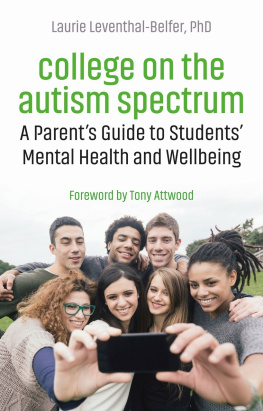

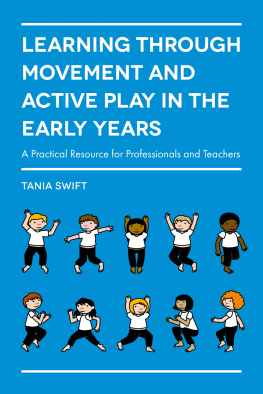
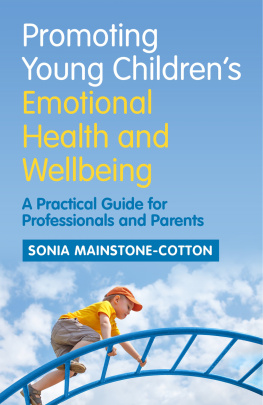
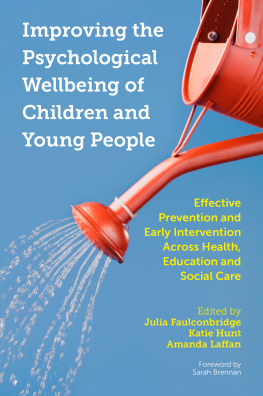

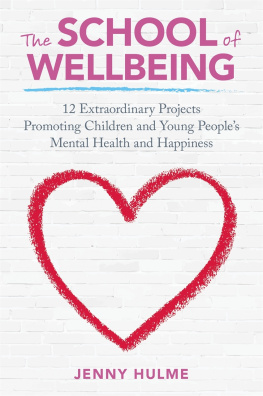
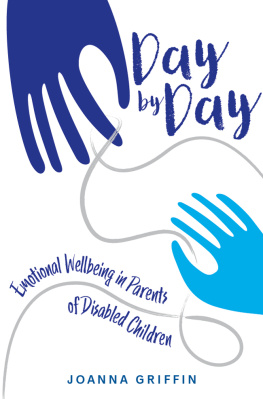
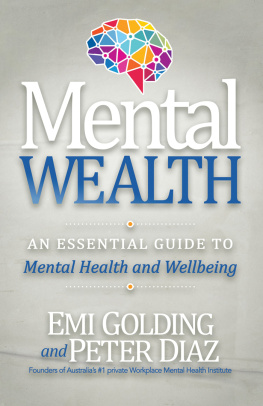
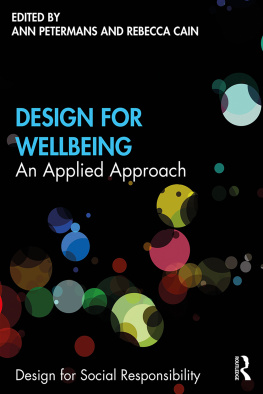
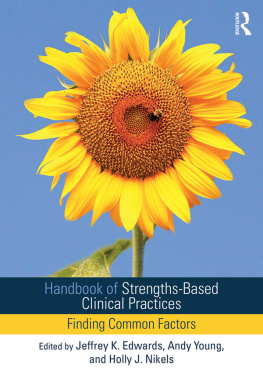


 , storing it in any medium by electronic means and whether or not transiently or incidentally to some other use of this publication) without the written permission of the copyright owner except in accordance with the provisions of the Copyright, Designs and Patents Act 1988 or under the terms of a licence issued by the Copyright Licensing Agency Ltd, Saffron House, 610 Kirby Street, London EC1N 8TS. Applications for the copyright owners written permission to reproduce any part of this publication should be addressed to the publisher.
, storing it in any medium by electronic means and whether or not transiently or incidentally to some other use of this publication) without the written permission of the copyright owner except in accordance with the provisions of the Copyright, Designs and Patents Act 1988 or under the terms of a licence issued by the Copyright Licensing Agency Ltd, Saffron House, 610 Kirby Street, London EC1N 8TS. Applications for the copyright owners written permission to reproduce any part of this publication should be addressed to the publisher.